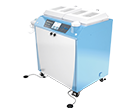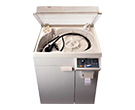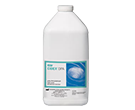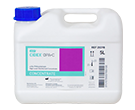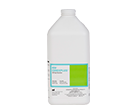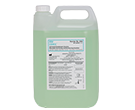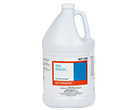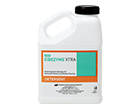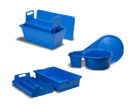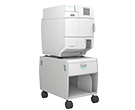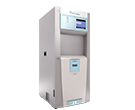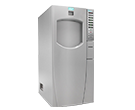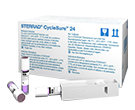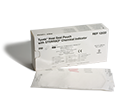ASP»About ASP»Video Library»What You Might Not Know about Meeting High-Level Disinfection Training Guidelines.
ASP Media
What You Might Not Know about Meeting High-Level Disinfection Training Guidelines.
Barbara Trattler, RN, MPA, CNOR, NE-BC Director, Clinical Education
(Barbara, dressed in professional attire and either seated or standing).
Hello, I’m Barbara Trattler, Director of Clinical Education for ASP. Welcome to this edition of the ASP Hot Topic Webisode series. In this installment, we’ll address some commonly-asked questions by our customers: How do I train my staff to meet guidelines requirements for high-level disinfection...more specifically, CIDEX OPA Solutions? What tools are available to help ensure this?
These issues are hot topics for healthcare facilities and our customers, as many of you have been asked these questions by the Joint Commission on Accreditation of Healthcare Organizations (JCAHO) surveyors. In order to address them, we’ll look closely at what the guidelines say.
(Transition to Patti, dressed in professional attire)
Thank you, Barbara. Hi, I’m Patti Fritz, Senior Clinical Education Consultant for ASP. I’m going to share with you some key reasons why association guidelines say it’s important to train your staff prior to using any high-level disinfectant. Most importantly, all staff should follow manufacturer’s Instructions For Use (IFU). Later on, we are going to share some tools available from ASP to simplify training and education of your staff in order to help you follow these guidelines.
First, let’s look at the Multisociety Guideline from the American Society for Gastrointestinal Endoscopy (ASGE). It states, “Improper use of high-level disinfectants can pose safety hazards to both patients and instrument reprocessing staff. In addition, Guideline 31 says: “All personnel using chemicals should be educated about the biological and chemical hazards present while performing procedures that use disinfectants.”
How often should you evaluate your staff’s competency?
ASGE Guideline 30 says: “Competency testing of personnel that reprocess endoscopes should be performed and documented on a regular basis (e.g., at the start of use, annually). Temporary personnel should not be allowed to reprocess endoscopes until competency has been established.”
This stresses the importance of having your staff be properly trained before they begin using high-level disinfects. It is necessary to perform regular competency testing to ensure proper procedure is being followed at all times.
So, how important is staff training for those that are testing these solutions?
The Joint Standard from the American National Standards Institute (ANSI) and the Association for the Advancement of Medical Instrumentation (AAMI) note that staff who are responsible for using chemical monitors and test strips should be fully trained.
Lastly, we’ll explore the Society of Gastroenterology Nurses and Associates, or SGNA’s, standard.
The SGNA’s “Standards of Infection Control in Reprocessing of Flexible Gastrointestinal Endoscopes” says, “Ensuring your staff is properly trained is also a key component in the fight against healthcare-associated infections (HAIs), as failure to follow proper reprocessing protocol can lead to the survival of
microorganisms and an increased risk of infection.”
That is why it is so important to work with a manufacturer that provides tools and resources to support the training of your staff. At ASP, we have a number of tools to help make the process of training your staff as smooth and easy as possible.
(Show In-Service Kit…inside of the binder and highlight the CD. )
For example, ASP provides an In-Service Kit for CIDEX® OPA Solutions which includes materials designed to be your resource in training your staff on on-going basis. The Kit includes everything you need to properly use and test CIDEX® OPA Solution for high-level disinfection, including a CD that provides education and instructions in a convenient binder.
This in-service kit can help address many of the common questions that we hear from our customers. For example, many of you have asked about what types of materials and medical devices can be used with CIDEX® OPA Solution (Show tab 3 to show the Technical Information). The Technical Information included in the In-Service Kit lists all materials that CIDEX® OPA Solution has been tested for, including a variety of metals, plastics, elastomers and adhesives.
(Show the log book). Customers are also curious about how to use CIDEX® Test Strips. These are used to ensure the minimum effective concentration (MEC) required for high-level disinfection, and it is recommended that you test CIDEX® OPA Solution prior to each usage. To help with this process, the kit also includes a data sheet and IFU for CIDEX® OPA Solution Test Strips, as well as a log book to record your test results (Show a log sheet within the log book). On this sheet you can record your quality controls, temperature reads and test results.
(Barbara, dressed in professional attire and either seated or standing).
Hello, I’m Barbara Trattler, Director of Clinical Education for ASP. Welcome to this edition of the ASP Hot Topic Webisode series. In this installment, we’ll address some commonly-asked questions by our customers: How do I train my staff to meet guidelines requirements for high-level disinfection...more specifically, CIDEX OPA Solutions? What tools are available to help ensure this?
These issues are hot topics for healthcare facilities and our customers, as many of you have been asked these questions by the Joint Commission on Accreditation of Healthcare Organizations (JCAHO) surveyors. In order to address them, we’ll look closely at what the guidelines say.
(Transition to Patti, dressed in professional attire)
Thank you, Barbara. Hi, I’m Patti Fritz, Senior Clinical Education Consultant for ASP. I’m going to share with you some key reasons why association guidelines say it’s important to train your staff prior to using any high-level disinfectant. Most importantly, all staff should follow manufacturer’s Instructions For Use (IFU). Later on, we are going to share some tools available from ASP to simplify training and education of your staff in order to help you follow these guidelines.
First, let’s look at the Multisociety Guideline from the American Society for Gastrointestinal Endoscopy (ASGE). It states, “Improper use of high-level disinfectants can pose safety hazards to both patients and instrument reprocessing staff. In addition, Guideline 31 says: “All personnel using chemicals should be educated about the biological and chemical hazards present while performing procedures that use disinfectants.”
How often should you evaluate your staff’s competency?
ASGE Guideline 30 says: “Competency testing of personnel that reprocess endoscopes should be performed and documented on a regular basis (e.g., at the start of use, annually). Temporary personnel should not be allowed to reprocess endoscopes until competency has been established.”
This stresses the importance of having your staff be properly trained before they begin using high-level disinfects. It is necessary to perform regular competency testing to ensure proper procedure is being followed at all times.
So, how important is staff training for those that are testing these solutions?
The Joint Standard from the American National Standards Institute (ANSI) and the Association for the Advancement of Medical Instrumentation (AAMI) note that staff who are responsible for using chemical monitors and test strips should be fully trained.
Lastly, we’ll explore the Society of Gastroenterology Nurses and Associates, or SGNA’s, standard.
The SGNA’s “Standards of Infection Control in Reprocessing of Flexible Gastrointestinal Endoscopes” says, “Ensuring your staff is properly trained is also a key component in the fight against healthcare-associated infections (HAIs), as failure to follow proper reprocessing protocol can lead to the survival of
microorganisms and an increased risk of infection.”
That is why it is so important to work with a manufacturer that provides tools and resources to support the training of your staff. At ASP, we have a number of tools to help make the process of training your staff as smooth and easy as possible.
(Show In-Service Kit…inside of the binder and highlight the CD. )
For example, ASP provides an In-Service Kit for CIDEX® OPA Solutions which includes materials designed to be your resource in training your staff on on-going basis. The Kit includes everything you need to properly use and test CIDEX® OPA Solution for high-level disinfection, including a CD that provides education and instructions in a convenient binder.
This in-service kit can help address many of the common questions that we hear from our customers. For example, many of you have asked about what types of materials and medical devices can be used with CIDEX® OPA Solution (Show tab 3 to show the Technical Information). The Technical Information included in the In-Service Kit lists all materials that CIDEX® OPA Solution has been tested for, including a variety of metals, plastics, elastomers and adhesives.
(Show the log book). Customers are also curious about how to use CIDEX® Test Strips. These are used to ensure the minimum effective concentration (MEC) required for high-level disinfection, and it is recommended that you test CIDEX® OPA Solution prior to each usage. To help with this process, the kit also includes a data sheet and IFU for CIDEX® OPA Solution Test Strips, as well as a log book to record your test results (Show a log sheet within the log book). On this sheet you can record your quality controls, temperature reads and test results.
Playlist
-

What You Might Not Know about Meeting High-Level Disinfection Training Guidelines.
Barbara Trattler, RN, MPA, CNOR, NE-BC Direc...
-

What You Need to Know About The Updated SGNA Guidelines - Webisode 5
...
-

Got Laryngoscopes? Get Answers with the ASP Hot Topic Webisodes!
in this Webisode, we will look at the issue o...
-

How Am I Supposed to Clean and Sterilize My Devices?
In this Webisode we will address one of the m...

